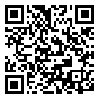BibTeX | RIS | EndNote | Medlars | ProCite | Reference Manager | RefWorks
Send citation to:
URL: http://hayat.tums.ac.ir/article-1-628-en.html
Background & Aim: Body image flexibility is defined as the capacity to experience the ongoing perceptions, sensations, feelings, thoughts, and beliefs associated with one's body fully and intentionally while pursuing chosen values. This study was aimed to translate Body Image flexibility Questionnaire (BI-AAQ ) into Persian language and assess the validity and reliability of the translated version as an instrument to measure body image resilience .
Methods & Materials: In this cross-sectional study, 354 students (130 males and 224 females) studying in an academic year (2012-2013) at Tehran University of Medical Sciences were selected through convenience sampling method . Students filled out demographic questionnaires, "body image flexibility questionnaires", "acceptance and action questionnaire edition 2", and "depression, anxiety and stress scale". For data analysis, IBM SPSS 21 and IBM SPSS Amos 21 software were used .
Results: The test-retest coefficient was 0.72. The correlation of the scale with the weight consent, psychological flexibility, stress, depression and anxiety was -0.54, 0.33, 0.33, 0.45, and 0.37, respectively which represented the concurrent validity of the scale. Confirmatory factor analysis results also showed that single-factor model of body image flexibility questionnaire has good fitting the Iran' community. Internal consistency reliability was estimated with Cronbach ’s alpha (α=0.87) .
Conclusion: Psychometric characteristics of the body image flexibility questionnaires showed that the questionnaire seems to be acceptable in Iranian society. It is a useful tool for research in the psychological and psychiatric clinics .
| Rights and permissions | |
 |
This work is licensed under a Creative Commons Attribution-NonCommercial 4.0 International License. |





